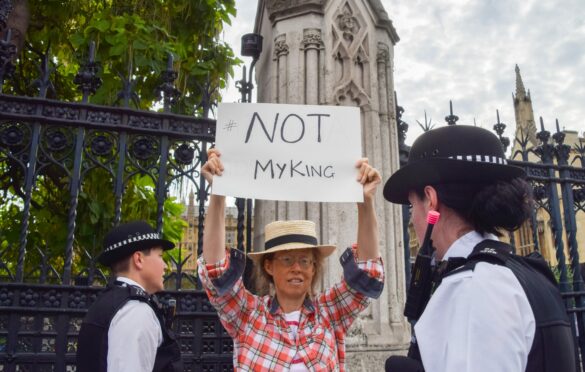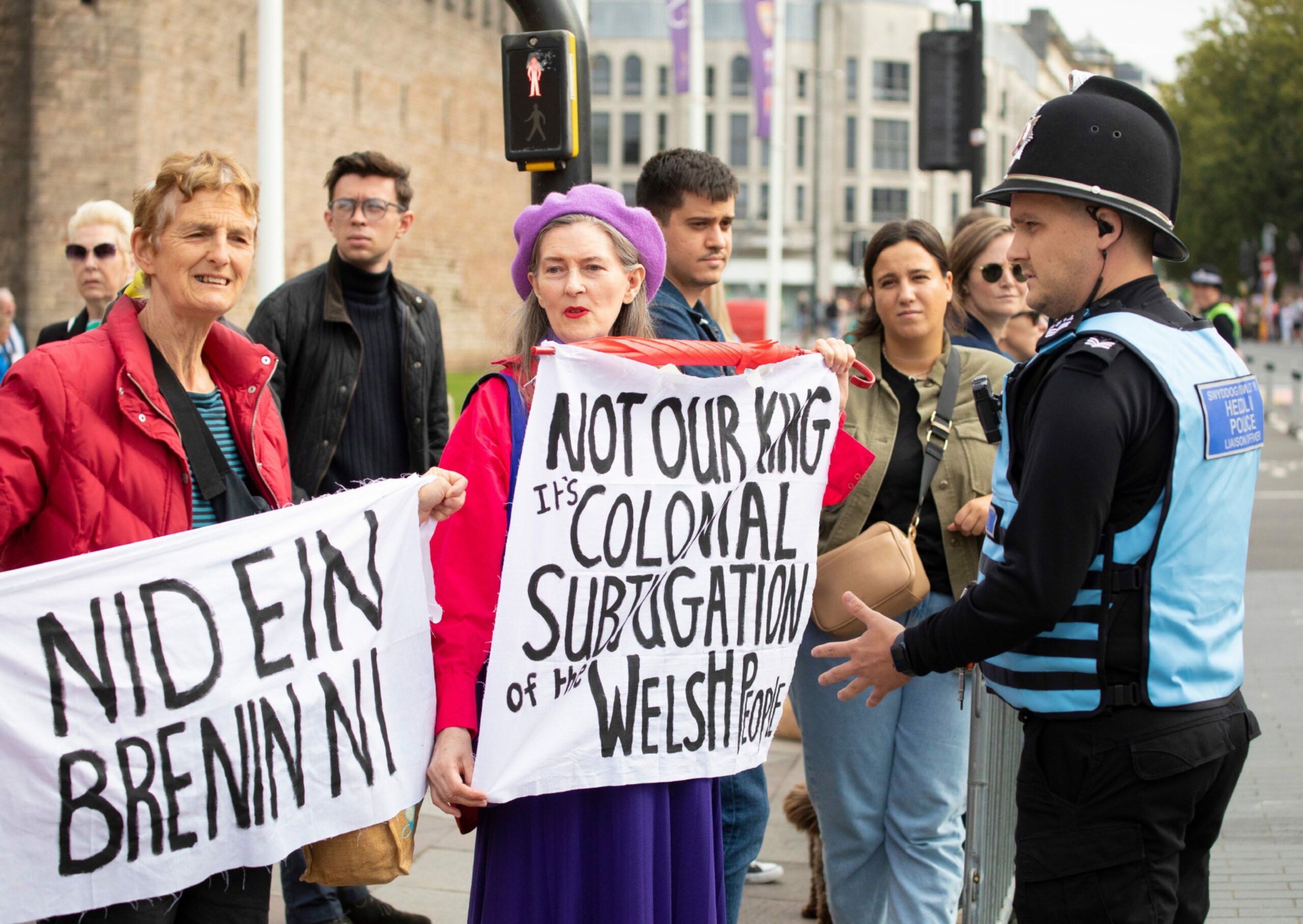
The arrests of anti-monarchy protesters after the death of the Queen have been described as “deeply concerning” and an “affront to democracy” by free speech and human rights campaigners.
Since the proclamation of King Charles III, at least three arrests have been made in Scotland and Oxford on suspicion of breach of the peace and public order offences, while another protester was also moved on by police in Westminster, central London.
But campaign groups have expressed concern at the way officers are policing protests as the new King is declared, with some warning the arrests may be unlawful.
Police Scotland said a 22-year-old woman was charged in connection with a breach of the peace after being arrested during the Accession Proclamation for the King outside St Giles’ Cathedral in Edinburgh on Sunday. She was released from custody and is due to appear at Edinburgh Sheriff Court at a later date.
On the same day, Symon Hill, 45, was arrested on suspicion of a public order offence under Section 5 of the Public Order Act after shouting “who elected him?” during a public formal reading of the proclamation of the accession of King Charles III in Oxford.
Thames Valley Police said he was later de-arrested and was helping officers “voluntarily” as they investigate a public order offence.
On Monday afternoon, a 22-year-old man was arrested “in connection with a breach of the peace on the Royal Mile”, Police Scotland said. Footage appeared to show a man heckling the royal procession as it went past.
Meanwhile a protester bearing a hand-made sign saying “not my king” was ushered away from the Palace of Westminster by police.
“Calling for the abolition of the monarchy is as old as the monarchy itself & is a cornerstone of freedom of speech in the UK” Waiting for so called free speech warriors to defend the right to say #NotMyKing & as for #PrinceAndrew 🙈 https://t.co/rTxEKkbMpb
— Aamer Anwar✊🏾🏳️🌈#BlackLivesMatter (@AamerAnwar) September 13, 2022
The incident happened as the King was due to arrive for his address to MPs and peers in Westminster Hall on Monday morning.
The woman was spoken to by police before being escorted away from the entrance to the Palace by a group of officers.
Ruth Smeeth, chief executive of Index on Censorship, said the arrests were “deeply concerning”, adding: “The fundamental right to freedom of expression, including the right to protest, is something to be protected regardless of circumstance.
“People across the country and beyond continue to mourn the loss of the Queen, a loss felt keenly by so many. However, we must guard against this event being used, by accident or design, to erode in any way the freedom of expression that citizens of this country enjoy.“
Silkie Carlo, director of Big Brother Watch, said: “If people are being arrested simply for holding protest placards then it is an affront to democracy and highly likely to be unlawful. Police officers have a duty to protect people’s right to protest as much as they have a duty to facilitate people’s right to express support, sorrow, or pay their respects.
“As millions come together to respect Britain’s traditions and national identity, it is important to remember that the right to freedom of speech is the foundation of British democracy and to disrespect it at this moment, when our country is under an international lens, would be to flagrantly disrespect the values that define our country.”
Jodie Beck, policy and campaigns officer at Liberty, said: “Protest is not a gift from the State, it is a fundamental right. Being able to choose what, how, and when we protest is a vital part of a healthy and functioning democracy.
Protest isn't a gift from the State.
IT'S A FUNDAMENTAL RIGHT.Being able to choose what, how, and when we protest is a vital part of a healthy and functioning democracy. https://t.co/fsMyyAiZzb
— Liberty (@libertyhq) September 12, 2022
“Whoever you are, whatever your cause, it is vital you are able to stand up for what you believe in without facing the risk of criminalisation. It is very worrying to see the police enforcing their broad powers in such a heavy-handed and punitive way to clamp down on free speech and expression.”
Labour MP Bell Ribeiro-Addy said on Twitter: “People are being arrested for expressing their opposition to unelected, hereditary power.
“If this was happening in Russia, the Government would be denouncing it on the international stage. Instead, they’re pushing ahead with further legislation to curb our right to protest.”
The Prime Minister’s official spokesman would not comment on individual cases or operational matters for the police, but said: “More broadly, obviously, this is a period of national mourning for the majority, the vast, vast majority of the country.
“But the fundamental right to protest remains as a keystone of our democracy.”
Under Scottish law, someone can be charged with a public order offence of breaching the peace if their behaviour is disorderly and could have a negative effect on those who witness it such as swearing or shouting.
In England and Wales, offences of disorderly behaviour – such as threatening or abusive language, behaviour, signs or writing – which is likely to cause others present harassment, alarm or distress fall under section 5 of the Public Order Act and could lead to a fine.

Enjoy the convenience of having The Sunday Post delivered as a digital ePaper straight to your smartphone, tablet or computer.
Subscribe for only £5.49 a month and enjoy all the benefits of the printed paper as a digital replica.
Subscribe © Shutterstock Feed
© Shutterstock Feed